allah l'a ke
Ministère de l'information du Mali. 1971. Première anthologie de la musique malienne: 5. Cordes anciennes. Barenreiter Musicaphon, BM 30L 2505.
(Ala La Ke)
To will what God wills
Is the only science
Which can give us rest... (Malherbe)
This sad song is played as a consolation.
God has willed it thus
You cannot change His law
You, a simple mortal.
Ministère de l'information du Mali. 1971. Première anthologie de la musique malienne: 5. Cordes anciennes. Barenreiter Musicaphon, BM 30L 2505.
(Ala La Ke)
Here again we have this melancholy song as interpreted, this time, by Batrou Sékou.
Knight, Roderic, prod. 1972. Kora Manding: Mandinka Music of The Gambia. Ethnodisc, ER 12102.
(Ala l'a ke)
In this performance, the four elements of jaliya detailed earlier are all clearly present [...]. The kora is tuned to Sauta.
Ala l'a ke (Ala le ye a ke) is one of the best known songs composed originally on the kora. The title means literally 'God has done it' and commemorates the settlement of a quarrel between two brothers over the right to the chieftanship of Fuladu after their father Falai Kora had died in the early days of colonial rule. The younger brother usurped the throne and at one point had his brother punished when he thought he had threatened his life. This brought attention to the usurper however, and the British governor had the rightful heir installed. Instead of meting out punishment for his younger brother, he only asked for an apology, saying that it was God's deed. The song was composed for this occasion.
| A, Ala l'a ke, silan jon m'a ke | Ah, God has done it, now it was not a man. |
| Kuo bee kari bai, | All things can be delayed, |
| Kunfai kuno te baila. | [but] not the wish of God. |
| Ala ye men ke te baila. | What God has done can't be delayed. |
| Kori bali ku la manso le | The omnipotent king |
| Kun far a kina ngana nin tabisi nani. | Head-splitting celebrity and... |
| N'ali be nganalu lala, nganalu man kanyan. | If you are calling great people, they're not all equal. |
| Damansa Wulandin nin Damansa Wulamba | Damansa Wulan the small and Damansa Wulan the big. [?] |
| Moke Musa nin Moke Dantuma | Moke Musa and Moke Dantuma |
| Tarokoto Bulai bangeta. | Tarokoto Bulai was born. |
| Ala ye men ke te baila | What God has done can't be delayed. |
| Dula be ngana juma fanan kilila | This song is calling other celebrities too |
| Somani Tamba, a Bajo bane. | Somani Tamba, ah, only child. |
| N'ali be nganalu lala, nganalu man kanyan. | If you are calling great people, they're not all equal. |
| E, nafa a barika. Sidi nuku makoto nin | Eh, thanks for profit. Sidi the greedy one and |
| Sanu men sanna, a, mansa silan. | buyer of gold, ah, king now. [?] |
| Dua le jabita, | Prayers have been answered, |
| ba nin fa dua le jabita. | mother's and father's prayers have been answered. |
| Lun min na nte lota julo da la | On the day I stood at the trader's door |
| Wori jula nin sanu jula. | Trader of silver and gold. |
| Suoluo, Samban Jime! | The horses, Samban Jimeh! |
| Suoluo, Samban Jime! | The horses, Samban Jimeh! |
| A, Ala l'a ke . silan jon m'a ke | Ah, God has done it, now it was not a man. |
| Kuo bee kari bai, | All things can be delayed, |
| Kunfai juno te baila. | [but] not the wish of God. |
| Kun fara kina ngana nin tabisi nani. | Head-splitting celebrity and... [?] |
| Nte lota Soma Maha da nani. | I stood at the four doors of the eldest son, Maha. |
| A barika. | Thank you. |
| Moriba Jane, Jane ngana la | Moriba Janneh the celebrated |
| Mandin mori Manju | learned Manding, |
| Ture ngana Mandin mori Manju, | Turay Manju, the celebrated learned Manding, |
| m b' e lala. | I am hailing you. |
| A, Ala l'a ke, silan jon m'a ke | Ah, God has done it, now it was not a man |
| Kuo bee kari bai, | All things can be delayed, |
| Kunfai kuno te baila. | [but] not the wish of God. |
Jobarteh, Amadu Bansang. 1978. Master of the Kora. Eavadisc, EDM 101.
(Alla l'aa ke)
Alla l'aa ke (God has ordained it). Alla l'aa ke is considered to be one of the most important and auspicious tunes in the kora repertoire, partly because of the religious significance of the refrain, which says that Man cannot undo the work of God. Amadu plays this tune whenever he and his patron are setting out on a trip, as well as on other occasions. Here he plays it as an instrumental solo. The recurrent theme combines an ostinato bass with the highly syncopated melody, on which Amadu has developed a number of virtuoso variations.
The subject of the song is a dispute that arose between two brothers over the Chieftaincy in Tambasansang following the death of their father, Chief Falai Kora. Although the elder brother, Mamadi, was entitled to the Chieftaincy, the younger brother, Kemonding, managed to gain the title. Subsequently he banned Mamadi from the region. Greatly angered, Mamadi consulted a marabout, who advised him that he would become Chief merely by going to his brother with peaceful intentions. When Mamadi attempted to approach his brother, however, Kemonding was frightened and had Mamadi assaulted and arrested. In order to avoid the disgrace that would ensue from bringing the case to court, the colonial authorities deposed Kemonding and appointed Mamadi as chief. After this, the two brothers made up the quarrel.
This piece has a special significance for Amadu, since his father was musician to Falai Kara.
It is played in Sauta tuning.
Knight, Roderic. 1982a. "Manding/Fula Relations as Reflected in the Manding Song Repertoire." African Music 6 (2): 37–47.
(Ala l'a ke)
p. 39
Table One . . . includes the best known, most often heard, or otherwise significant songs in the [Gambian] repertoire. In each column the top few songs are the oldest, and the bottom few are the youngest. The majority in each case fall somewhere in between (often in the nineteenth century), but no chronological ordering beyond this is intended, since it is often not possible to date a song exactly. Most of the songs bear the name of their owner as the title. Where they do not, his name is shown in parentheses next to the title. The letter code at the right represents the person's "claim to fame" or calling in life, as shown in the bottom of the list.
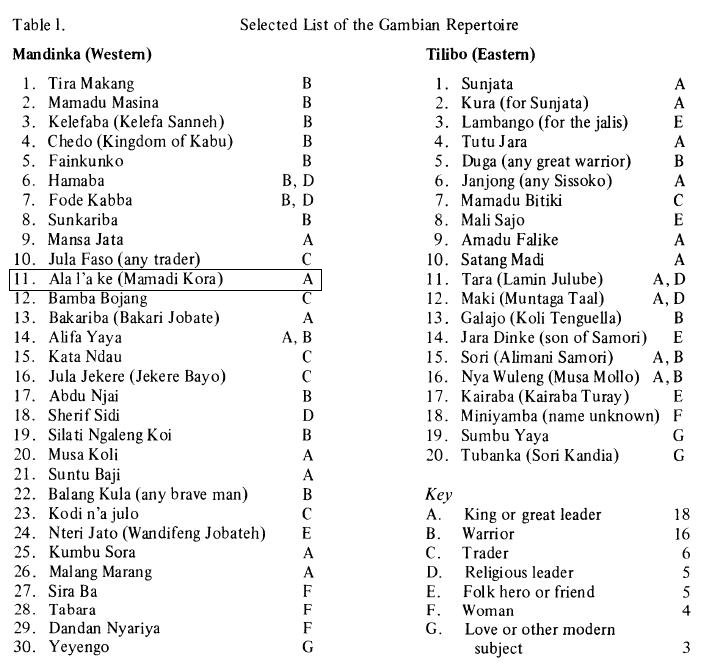
p. 40
Table Two shows the same fifty songs again, grouped this time by the ethnic background of the people commemorated.
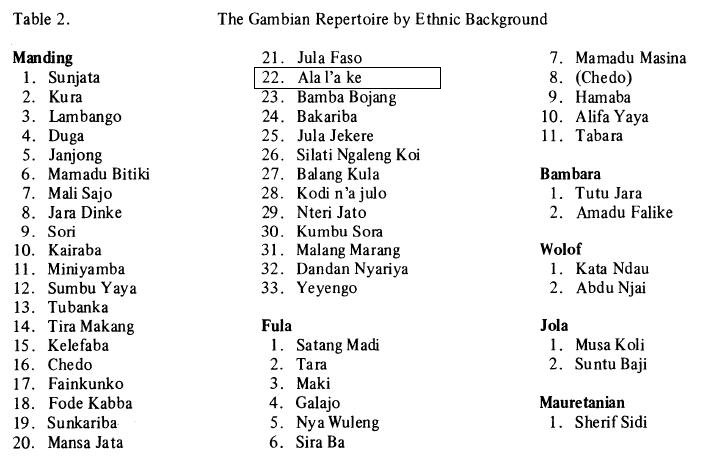
Jessup, Lynne. 1983. The Mandinka Balafon: An Introduction with Notation for Teaching. La Mesa, Calif.: Xylo.
(Ala L'a Ke)
p. 50
Much of the repertoire has evolved through slight changes in the kumbengo and additional or totally new lyrics. In this way it has been possible for the jali to relate his patron to a heroic figure of the past, e.g. "Ala L'a Ke."
pp. 107–8
Donkilo (on teaching tape)
| Ala la ye a ke* | God has done it, |
| Jongo mang a ke** | Now no man has done it; |
| Be kari bayi le | Everything can be delayed, |
| Ala la baroo jongo te wo bayi la | Except God's work, man can't postpone |
| * pronounced - Ala l'a ke | |
| ** pronounced - Jongo m'a ke |
Background to "Ala L'a Ke"
This song commemorates the settlement of a dispute between Mamadi Kora and his brother over the chieftainship of Fuladu. Their father, Fali Kora died in the early colonial days and the younger brother took possession of the chieftaincy. He thought his older brother would try to kill him, and he treated Mamadi very badly. However, the British colonial government discovered the mistake and installed Mamadi as the rightful ruler. Instead of seeking revenge and punishing his brother, Mamadi asked only for an apology from him, saying:
"God has done it,
It was not a man.
All things in this world can be delayed
Except for the works of Allah Almighty."
Related Information
See "Apollo."
pp. 146–59 (Appendix 2: Balafon Repertoire)
| Title | Ala l'a Ke |
| Translation: | God Has Done It |
| Dedication: | Mamadi Kora, Falai Kora |
| Notes: | developed into Apollo |
| Calling in Life: | King or Leader |
| Original Instrument: | Kora |
| Region of Origin: | Manding (Western Coastal Region) |
| Date of Origin: | M (19th & 20th c. up to WWII) |
| Sources: | 1, 3 (Jessup & Sanyang, R. Knight 1973) |
Haydon, Geoffrey, and Dennis Marks, dirs. 1984. Repercussions: A Celebration of African American Music. Program 1. Born Musicians: Traditional Music from The Gambia. Chicago: Home Vision.
(Allah la ke)
This song is called Allah la ke which means "God wills it."*
* Transcription mine. Orthography based on Jatta (1985).
Knight, Roderic. 1984. "The Style of Mandinka Music: A Study in Extracting Theory from Practice." In Selected Reports in Ethnomusicology, vol. 5, Studies in African Music, ed. J. H. Kwabena Nketia and Jacqueline Cogdell Djedje, 3–66. Los Angeles: Program in Ethnomusicology, Department of Music, University of California.
(Ala l'a Ke)
p. 9
In "Ala l'a Ke" (Allah's Deed), the usurpation of a chiefdom is forgiven upon restoration of the rightful leader, with the lines, "It was Allah's deed, not an act of man. In this life, everything can be delayed, except the will of Allah."
p. 12
Example 3. A donkilo line from "Ala l'a Ke."16
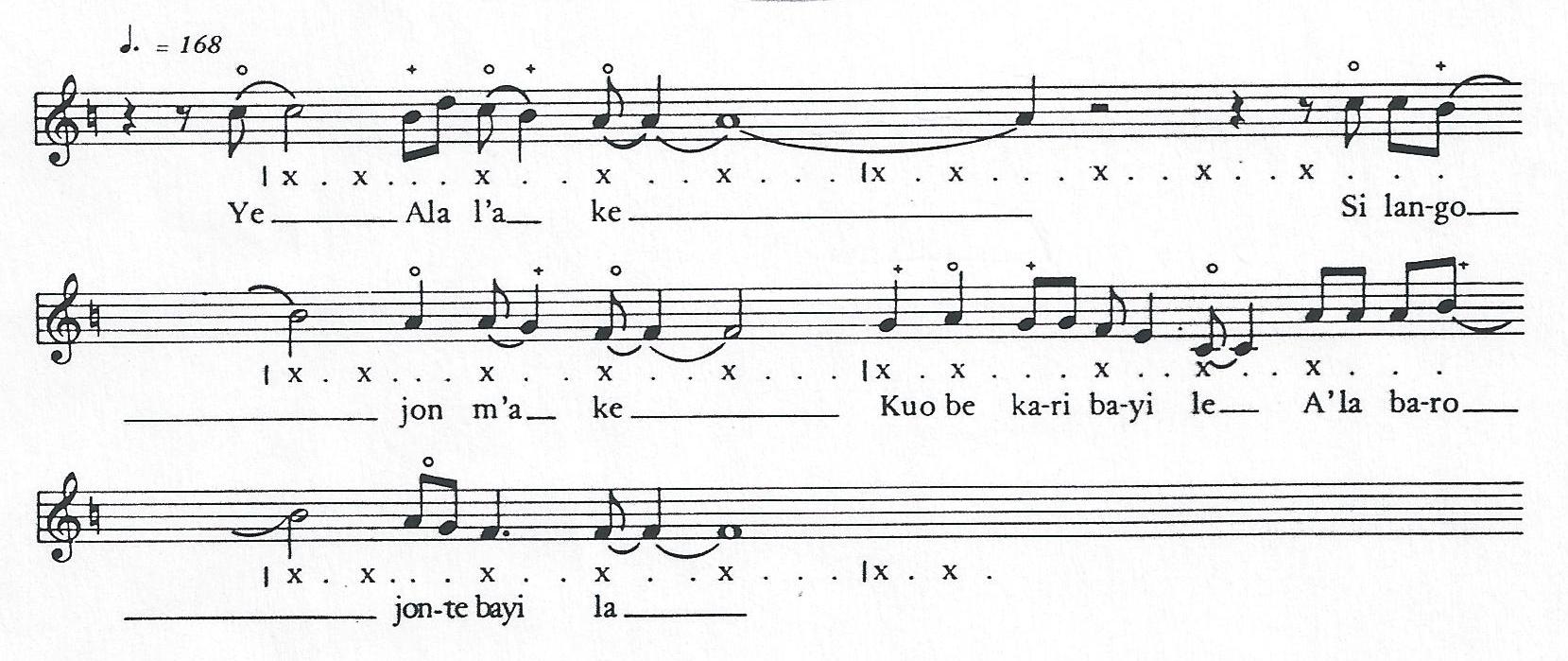
16. A similar performance may be heard on ER 12101, A-3.
p. 13–14
Example 5. "Ala l'a Ke," kumbengo and donkilo.
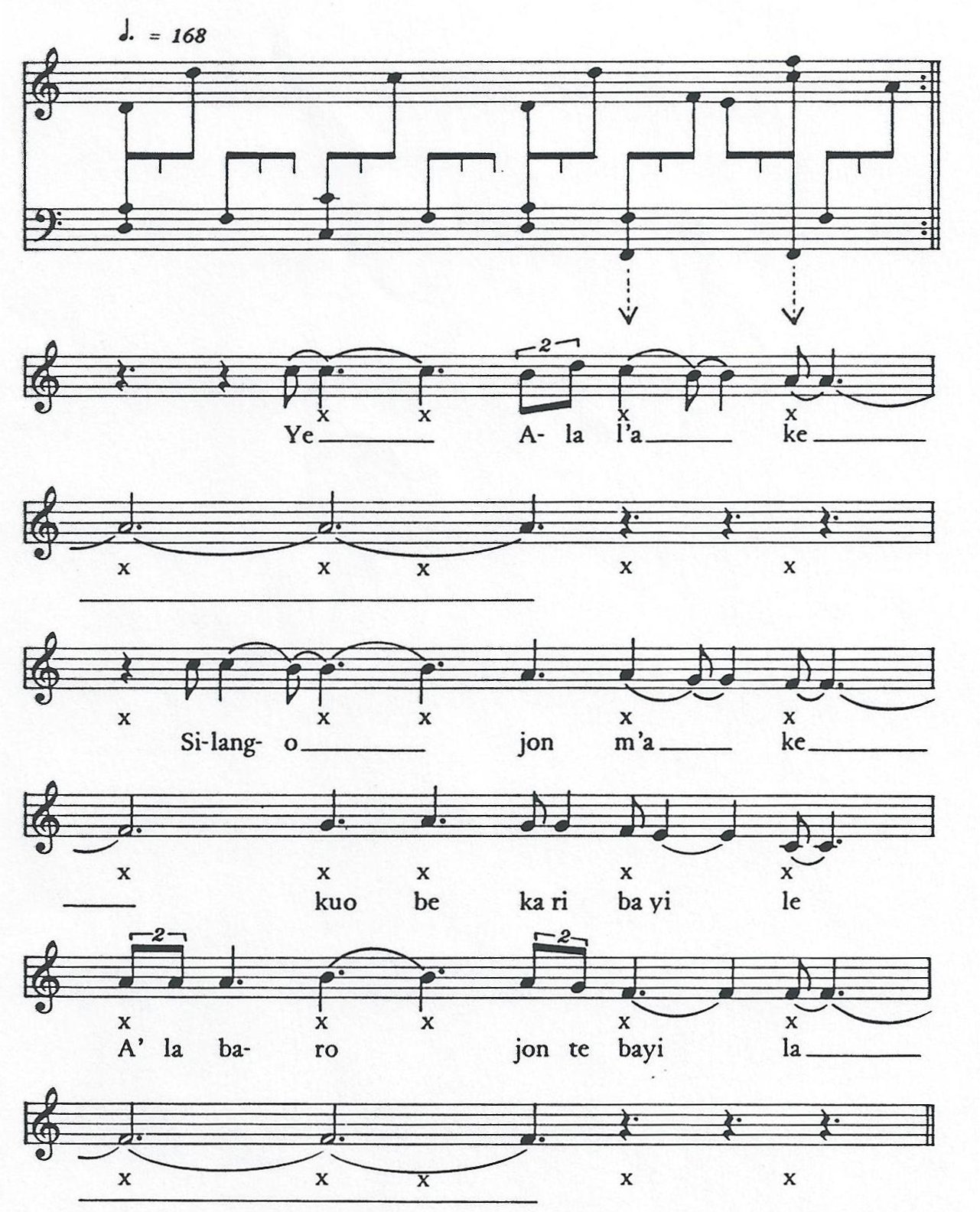
A given donkilo melody spans a certain number of kumbengo statements (usually one to four) and aligns with it in a specific way. For an example of this . . . please refer to Example 5 on the previous page. It is the "Alla l'a Ke" [sic] donkilo aligned under one statement of the kumbengo.
p. 17
"Ala l'a Ke" (Examples 3 and 5) is an example of a song in Sauta tuning. This tuning has only one mode of usage. Note however that this vocal line is somewhat flexible, using an unraised fourth in the last phrase.
p. 19, 23
Melodically we may discern three types of kumbengo, based on their relationship to the donkilo.
Type III: Independent. The independent kumbengo is also characterized by two parts—on the kora the lower line is played by both thumbs while the upper line is played by both forefingers—but these two parts bear no melodic relationship to the donkilo line, providing instead a bass line and countermelody to it. Independent kumbengolu tend to be short, requiring from two to eight statements to span the donkilo line. "Ala l'a Ke" (Ex. 5) is a prime example of the independent kumbengo.
p. 28
A few other features of the kumbengo rhythmic style must be noted. One of these is the offsetting of one part from another. Consider, for example, the upper and lower lines in the kumbengo for "Ala l'a Ke." Separately, they might be shown as follows:
Example 19. "Ala l'a Ke," upper and lower parts of kumbengo.
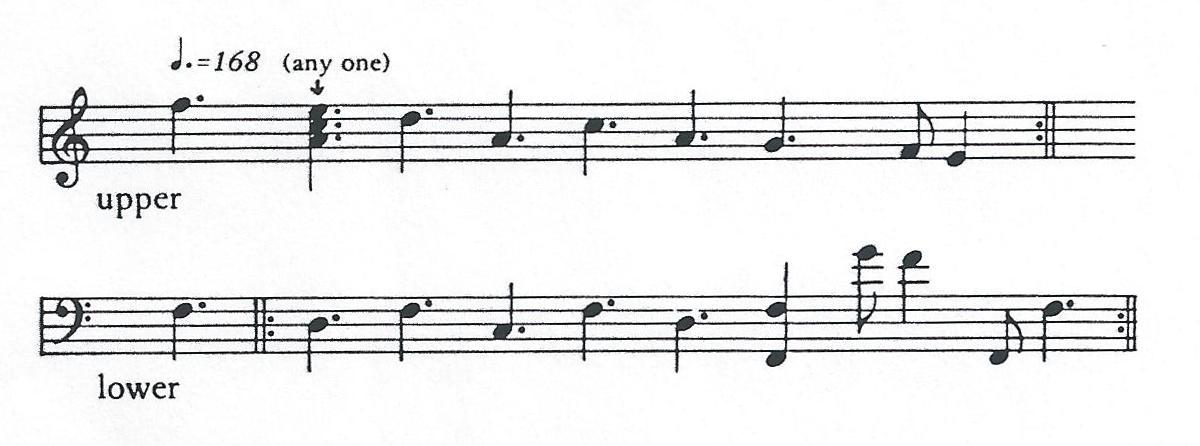
When played together, we note that the upper melody anticipates the lower part:
Example 20. "Ala l'a Ke" kumbengo.

Irregular accents are not uncommon; an example may be seen in the bass line of "Ala l'a Ke," above, proceeding quite regularly until the last three pulse groups.
Kouyate, M'Bady, and Diaryatou Kouyate. 1996. Guinée: Kora et chant du N'Gabu, Vol 1. Buda, 92692-2.
(Ala la ke)
"God's will or fate". Dedicated to Mamadou Korou, a rich man from Casamance who was the victim of a conspiracy: he was tied up and turned over to the authorities. His griot sung [sic] this song when he left: "Mamadou, no mortal could overcome you, God's will only was accomplished!"
Mandeng Tunya. 1997. M'Fake. Mandinka Magic Music. U.S. cassette.
(Allah Lá Ke)
"It's the work of God." Originating in Guinea-Bissau, the original song dates from the advent of conversion from animism to Islam, and tells a story of Reconciliation and Patience in the face of adversity.
Sissoko, Djelimoussa "Ballake." 1997. Jeli Moussa Sissoko: Kora Music from Mali. Bibi B. Bucking Musikverlag/Nbg., 9764-2 Indigo.
(Alla La Kè)
"God has done it. No one stays in this world forever..."
Alla La Kè is an old Kora classic from the Gambia. Played in the same 4/4 beat as Bamba Leje, the improvisation leads into the characteristic contemporary dance rhythms of Bamako at several points.
Suso, Foday Musa, and Bill Laswell. 1997. Jali Kunda: Griots of West Africa and Beyond. Ellipsis Arts, CD3511.
(Allah l'aake)
Literally, "God's will." West African Griots are Muslims who believe that everything in the world is God's will. Whatever God decides, happens.
Charry, Eric. 2000. Mande Music: Traditional and Modern Music of the Maninka and Mandinka of Western Africa. Chicago; London: University of Chicago Press.
(Allah L'a Ke)
p. 148
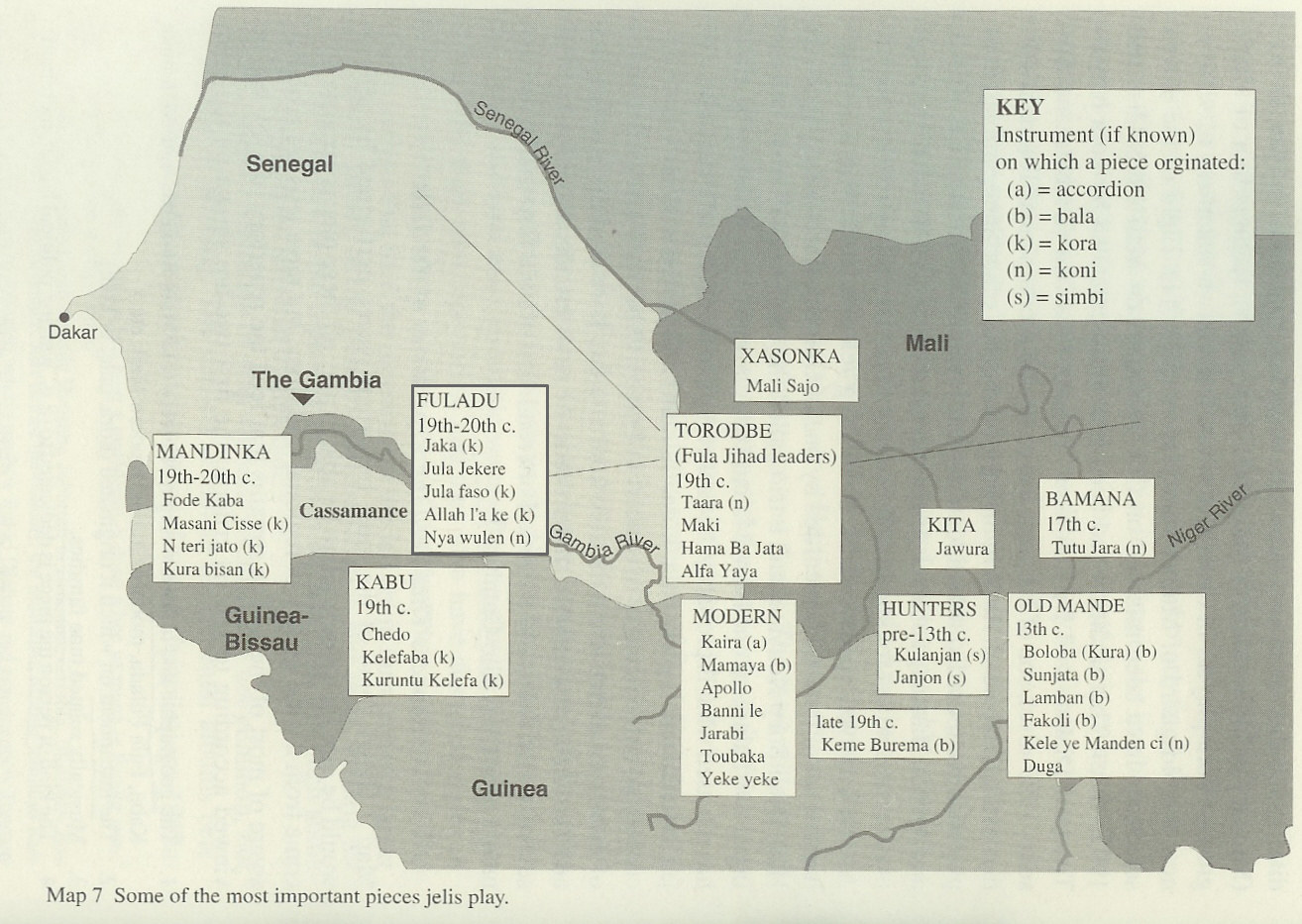
p. 149
A few pieces from the Gambia, such as Masani Cisse and Allah l'a ke, have also entered the repertory of Malians owing to their widespread popularity.
p. 153
Jawura is a popular dance rhythm from Kita, Mali that may have originated on the bala. Sidiki Diabate (1990-per: 37–40) considered it a wellspring for composers and cites it as the mother of the kora pieces Allah l'a ke and Jula faso.
p. 154
Allah l'a ke (Allah has done it) has probably travelled the farthest of all kora pieces. The Cain and Abel-like story concerns the children of Falaye Kora, chief of Tumana district in eastern Gambia appointed by Fulbe leader Musa Molo at the dawn of the British colonial era in the late nineteenth century. The piece belongs to Mamady Kora, the eldest son who should have inherited the chieftancy when his father died. But his younger brother Kemonding convinced the town elders to give him the chieftancy instead, then banished his elder brother from Tambasansang, the seat of the district. When Mamady returned, Kemonding had him locked up. Mamady eventually had the chieftancy rightfully given to him, and rather than exacting revenge, he forgave his younger brother. Amadu Bansang Jobarteh, whose father and in-laws were intimates of the parties involved in the story, believes the composers of Allah l'a ke were his father-in-law Kunkung Kanute and someone named Hamadi.
pp. 169–76, 178, 180
(See Charry, 2000.) (Kora transcriptions and discussion.)
p. 321
"This is the Sauta tuning [kumbengo]. I just played the piece [julo] Sauta. This here is its tuning [kumbengo]. You can play Tutu [Jara] in it, you can play Allah l'a ke in it. No matter what the piece, if it pleases you, you can play it there [in the Sauta tuning]." (Jobarteh 1990-per:A51)
p. 323
"You know, there are many kumbengos in Allah l'a ke. This is its first one. Yes, Amadu Bansang [created] that one. This is another kumbengo, they are all Allah l'a ke. I play it like this. This also is mine." (S. Diabate 1990-per:33)
pp. 398–401 (Appendix C: Recordings of Traditional and Modern Pieces in Mande Repertories)
Kora: Allah L'a Ke
Unidentified (Guinea Compilations 1962b)
Bembeya Jazz (Guinea Compilations 1971)
Batrou Sekou Kouyate (Ministry of Information of Mali 1971, vol. 5/ Musiques du Mali 1995a)
Santoutou Kanoute (Tapa Sora, 1988)
Konte and Kuyateh (1992)
Sunjul Cissoko (1992)
Jali Nyama Suso (1992-vid)
Jali Nyama Suso and Alhaji Suntu Suso (Knight 1992-vid)
Mory Kante (Mali-ba, 1996)
M'Bady Kouyate (1996, vol. 1)
Diabate, Toumani. 2001. Jarabi: The Best of Toumani Diabate; Master of the Kora. Hannibal, HNCD 1462.
(Alla L'Aa Ke)
"Alla L'Aa Ke" is a classic piece from the Gambian kora reportoire, a piece often played by Toumani's father Sidiki whose torrential aggressive improvisatory style has clearly left its mark on the son. The story behind All L'Aa Ke (God willed it) was a fierce quarrel between two brothers, sons of a chief who ruled under British colonial administration at the turn of the 20th century in upper river Gambia. When the chief died, the British appointed the younger son, thereby going against traditional laws of secession and threatening to destabilise the region. Luckily, the dispute was resolved and the older brother was appointed chief, much to everyone's relief. Hence the title: it was God's will that all this should happen.
(Allah L'A Ke)
A Mandinka invocation to God and a moral lesson.
| Ye Allah l'a Ke, Silan wo don m'a ke. Kuo be kari bayi le Allah baro, djonte bayi la Jaliya le n'yo mada; jaliya mo kan kèlèntidi. Jali ke nin ke te kèlènti baba tunya ri dio; Jalimuso nin te kèlènti na tunya ri dio. Kònò du saba le dunya rotero hara baden kana le wosabe dandi. Kero kònò nin wade dunya jama tutukoro tunyala ko. Hara bade kònò be kasi mo ninfina. Woyie terela komindo tono to wola Tefili fana ta manyama fanaba cursi dom Adi brin kanta, Adi tama mese mese Adi wi lo bundala "Kombara kuman kura kura me." Yenin foli ke leleyen kata moyen, "Yonin foli yen badenya le ma Ada g'na wulu ku walaka Ado fo felen silama Adi badenya wo janfa Adi manamana-kan tola Na bana naola adi si fonya di janfa Wo kaffiri da sibo kuju to le korondoba bolo dun i yènrèro. Jaliya la n'yo mada, jaliya mo kan kelentidi. Jali ke nin ke te kelenti baba tunya ri dio. Jalimuso nin kelenti baba tunya ri dio. | All praise to God, God who created all things. What God has created, cannot be taken away. Jaliya is different; jaliya is one voice. Jali men are different from other men; Jali women are different from others too. There are three birds (spirits) in the world. The human spirit is the last. If there is someone you don't know You can't sympathize with him. You can tell a liar, he hides in his costume and listens at the door. "I heard something new," he says, but he doesn't know what he hears. "I'll tell you a secret, because we're family." That's the way the liar is, that's the concern of the community. That's loose talk. When he's finished his lying he'll need to go out for some air. Before you talk about others, take care of yourself. Jaliya is different, jaliya is one voice. Jali men are different from other men; Jali women are different from others too. |
Jobarteh, Dembo. 2003. Listen All. CD Baby.
(Allah La Ke)
The title means "What God promises, will happen." People can fail you, but not God.
Ba Cissoko. 2005. Electric Griot Land. All Other/ 3D Family, 5101124392.
(Allah Lake)
| God wanted it that way | C'est Dieu qui l'a voulu |
| All existing can cancel itself except God's will | Toute chose peut s'annuler sauf la volonté de Dieu |
| God wanted it that way | C'est Dieu qui l'a voulu |
| No one else has done it | Personne d'autre ne l'a fait |
| If you are a chief, God's benediction is on your side | Si tu es un chef, c'est la bénédiction de Dieu qui est à tes [sic] côté |
| Man proposes, God disposes. | L'homme propose, Dieu dispose. |
Knight, Roderic, dir. 2005. Mande Music and Dance: Performed by Mandinka Musicians of The Gambia in the Late Twentieth Century. Lyrichord Discs, LYRDV-2001.
(Allah L'a Ke)
pp. 25–26
"Allah l'a ke" ("Allah's Deed"), a staple of the kora repertory, was composed by Hamadi Suso and stems from an event in Fulladu in 1913. Two years earlier, Chief Falai Kora had died. By tradition, his eldest son Mamadi should have succeeded him, but Mamadi was not particularly popular in the community. Since he was away at the time of his father's death, the villagers contrived to have Mamadi's younger brother Kemonding installed instead. When Mamadi returned, the colonial justice system came to his aid and he was eventually reinstated. Rather than create more ill will over the incident, Mamadi dropped the matter, saying "Allah l'a ke" – it was Allah's will. The opening donkilo line of the song amplifies on this theme.
| [Suntu speaks] | Yo, mba! | Yes, friend! |
| [both sing the opening donkilo line] | Ye, Allah l'a ke, silango jongo m'a ke | Yes, Allah has done it, now it was not a man (lit. "slave," i.e., slave of God). |
| Kuo bee kari bayi le, Allah la baro, jon' te bayi la | All things can be postponed, [but] Allah's work, man cannot put aside. | |
| [Suntu announces] | Jali Nyama Suso, aning Suntu Suso, | Jali Nyama Suso, and Suntu Suso, |
| [Nyama interjects] | Tonya! | (True!) |
| Wolu le be "Allah l'a ke" kosila jang. | We two are playing "Allah l'a ke" here. | |
| [Nyama] | Tonya, a baraka. | (True, thank you.) |
| [both sing] | Ye, Allah l'a ke, silango jongo m'a ke. | Yes, Allah has done it, now it was not a man. |
| kuo bee kari bayi le, Allah la baro, jon' te bayi la |